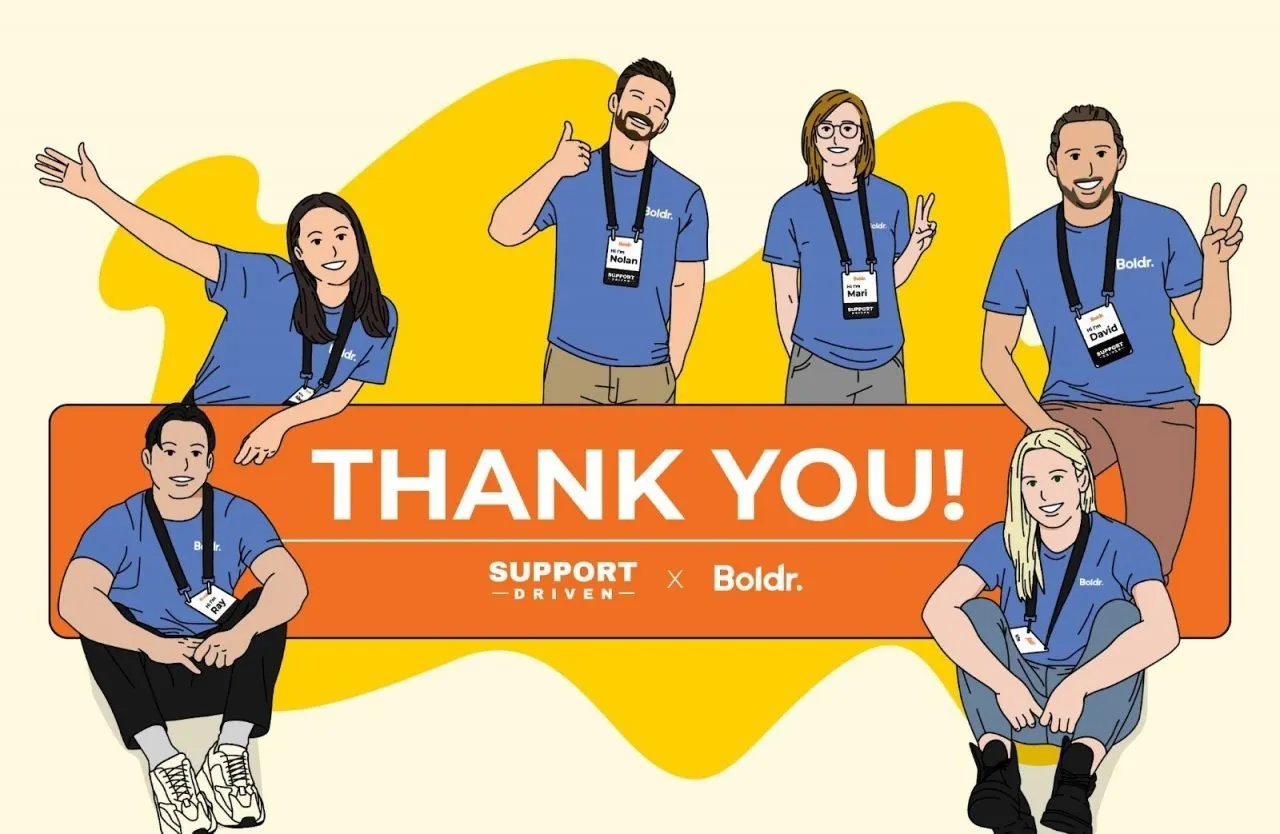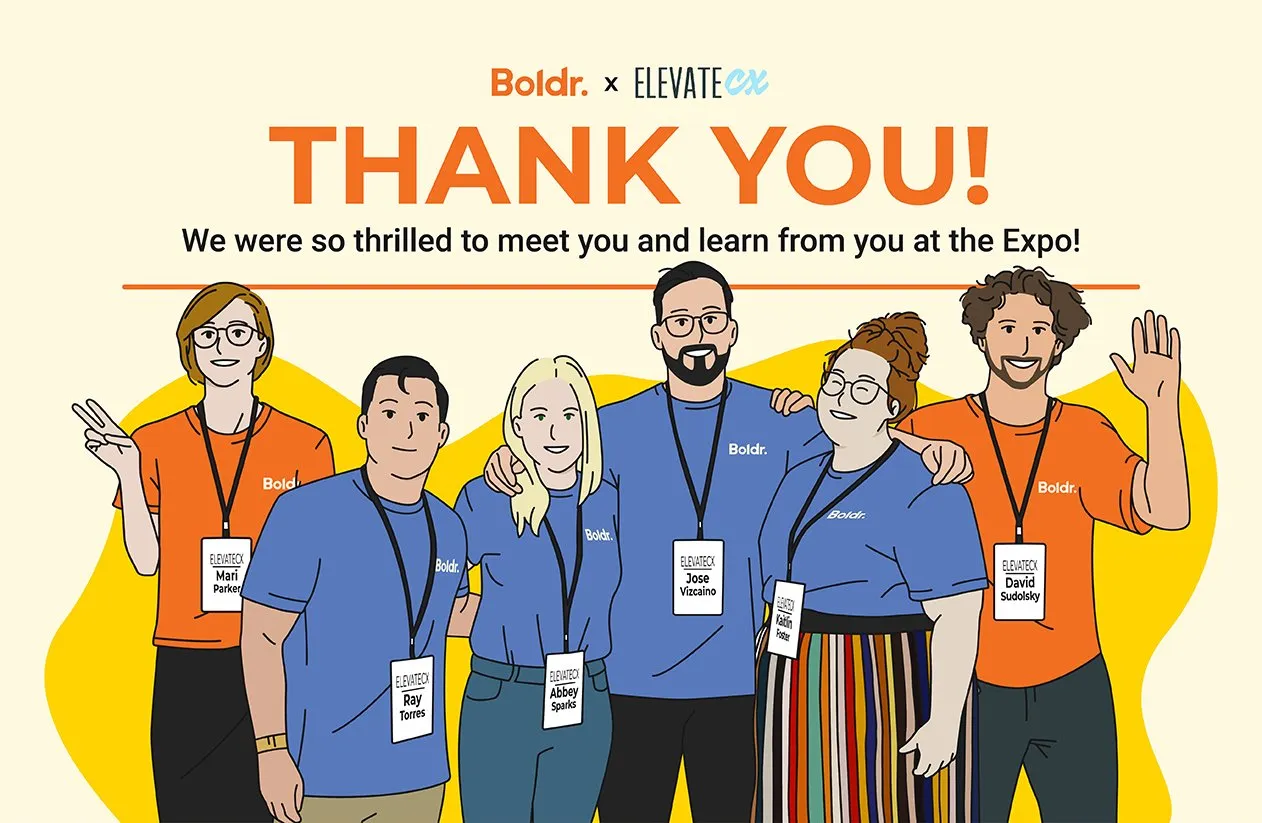At the 2022 Support Driven Expo in Las Vegas, the themes of Mentorship and Succession Planning reigned supreme. Considering how customer service has adjusted to industry changes, like remote working, or the renewed focus on employee well-being and team diversity, it is easy to understand why these themes have become industry buzzwords.
As sponsors of the conference’s career development track, we had the honor of hosting a panel discussion at the event. The topic was: What I Wish I Knew: Advice for Navigating a CX Career. The discussion was moderated by Mari Parker, Boldr’s COO. Seated on the panel as guests were Caillan Groose (Customer Support Operations Manager at GasBuddy), Keisha Armand (Director of Support at Afresh), and April Troester (Head of Service and Support at String and Key).
Here’s a summary of the questions Mari posed to the panelists and a condensed version of their discussion.
What would you have done differently in your career as a CX professional?
Standing up for better pay
Since the majority of CX workers are women, this is a way of calling out the old sins of inequality in the business process outsourcing (BPO) or customer experience (CX) industries. A disparity in remuneration still remains a reality today, but steps have been taken towards creating awareness, while some companies have aligned their vision and mission to circumvent or address this concern.
Implementing a Living Wage mandate or obtaining a B-Corp certification, not only serves as an aid to eradicate the industry of this and other inequalities, but it also legitimizes a company’s efforts to be a part of the change.
Asking for help
There is no university degree in customer experience. Until recently, there has been a general lack of prevailing wisdom to draw from. There was a limited focus on mentorship, which meant that asking for help was not the go-to approach when team members wanted to know more. With the rise of support communities, like Support Driven, CX professionals finally had a space to engage with one another, and share their best practices and experiences.
Curiosity has since become a sought-after trait, especially in the CX industry. “Don’t worry about knowing all the answers but ask the right questions,” added April Troester. One of the biggest challenges to overcome is getting the buy-in from leadership to put mentoring systems in place for those who are eager to learn.
What has been the most valuable for you in a mentor/mentee relationship?
A mentor/advisor can set you up for success
The impact of having a mentor or advisor can ultimately propel your career to new heights or enable you to break through personal barriers. “My mentor pushed me to go to conferences, to take advantage of every opportunity for training,” recalled Caillin. “She pushed me out of my comfort zone and encouraged me to advance and learn.”
Though the process can be challenging or complex, the fruits can be plentiful and diverse, whether you are looking for validation, clarity, growth, or solutions to specific problems. But it is incredibly important to find the right mentor, especially one who shares your values.
Finding the right mentor
“It’s trial and error,” explained Keisha. “I looked at people in the company who I trusted and respected and asked for mentorship. I sought mentors who asked good questions — What problems are you facing? What does your day-to-day look like?” She added that the mentor/mentee relationship is largely dependent on the individual’s approach. “You get out what you put in. I came prepared with good questions, knowing that I could choose to apply their answers. I came with what I struggled with; questions that were more philosophical, problems that were more tactical, or even a challenging relationship I was dealing with.”
What are you looking for in a successor?
Finding the right successor
According to Caillin, your closest teammate may not be the best option as a successor. Someone might be great at what they do, but they might not seek leadership, which would hamper your succession plans. It’s also important to note that a high-performing individual may not want to be a leader. “I recognized early on that the most talented people on the team may not want to move up.”
For April, the process of finding a successor entails dividing her responsibilities for others to take on. In so doing, she systematically exposes the entirety of the role to her successor. This provides a vantage point for you to see where they need mentorship, or whether they are able to take on the role.
“Be thoughtful about leadership traits versus performance,” Mari cautioned leaders who are looking for their replacement. “Being fair is not always being equal.”
Building a succession plan
“I always want to move up,” noted Keisha. “I’m constantly being challenged and held accountable. This elevates me and allows me to move up. Because of that, I’m always thinking of my succession plan. That’s why I hire people who are smarter than me.”
Future-proofing a business or even a specific department within a company, usually comes down to the team members. Careful recruitment, talent development, team engagement, and a high employee retention rate, all form part of a great succession plan.
How do you identify burnout?
Caillin pointed out that when you notice someone disengaging, it is a clear sign that the team member is experiencing burnout. You might need to prompt them by asking what they want or to find out what is getting in the way of them enjoying their role.
To prevent burnout from showing its ugly face, April urged leaders to make sure that people were using their Personal Time Owing. Adding to this, Keisha recommended building project time into their workday, automating the more tedious things, and ensuring that part of their job is dedicated to making their job better. This creates an environment where we are emotionally tapped into our teams.

“Belonging equals a feeling of safety, and creates an environment where team members can push themselves and grow as a person,“ Mari said in closing. “When we integrate the way we care for our team on a daily basis, it can be powerful.”
As always, it was such a great experience to meet up with fellow CX professionals and engage with them. The energy at the Support Driven Expo was palpable. The entire team took joy in immersing themselves in the excitement of it all and learning from the experiences of their peers.
James Fouche is a Content Writer at Boldr, an author and a columnist. He is passionate about sharing his love of reading and writing with others.


